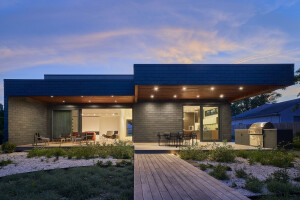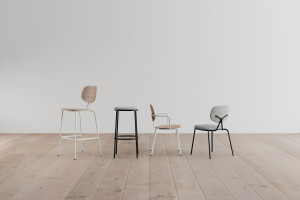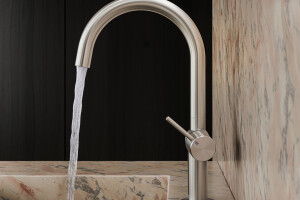The Plugin House is an easily assembled house made from prefabricated parts. It is a design proposition–suggesting new building technology that considers financial, social, and environmental concerns. The Plugin House demonstrates the possibilities of smaller, more sustainable living for contemporary urban landscapes.
There is a movement among local and municipal governments to introduce policy to encourage the construction of small homes in infill areas or even backyards, efforts meant to address the housing crisis faced by many cities. Accessory Dwelling Units (ADUs) provide an alternative to the outward expansion of cities. Through infill, new housing in existing communities take advantage of infrastructure, public services, and community networks that are already in place. While these policies are gaining momentum, the cost of building ADUs remains beyond the reach of most people. The Plugin House can cut costs in half, making ADUs an affordable housing option.
The Plugin House was brought to Harvard University to showcase its innovative features.
Sponsored by Harvard’s Office of the Arts and the Harvard Loeb Fellowship at the Graduate School of Design, students - new to design and construction - built the Plugin House in the heart of Harvard yard in six hours using a single tool.
As a central feature of the Harvard Arts First Festival, the Plugin House combined Design with Arts + Culture as an animating force, bringing activity, vibrancy and audience to the center of Harvard Yard. Working in collaboration with Harvard Loeb Fellow Eric Williams and Chicago’s Silver Room, the Plugin House hosted site-specific installations and events including video installations, DJ sets, art exhibitions and dance performances. Afterwards the Plugin House was disassembled and rebuilt at Boston City Hall. The entire relocation process took a couple days and required no replacement parts.
Partnering with the Mayor of Boston’s Housing Innovation Lab, volunteers erected the Plugin House in front of Boston City Hall. Artists for Humanity, a local non-profit, made drawings on the walls and floor to help visitors imagine how the Plugin House interior could be fitted out and organized. The Housing iLab organized open events with community leaders, policy makers, and housing advocates to discuss how solutions like the Plugin House can help alleviate the city’s housing crisis. A public exhibition presented PAO’s work, information on accessory dwelling units and the city’s current ADU policy pilot. The Plugin House hosted over one thousand visitors and collected a wealth of feedback for policy makers during the two-week period.

















































